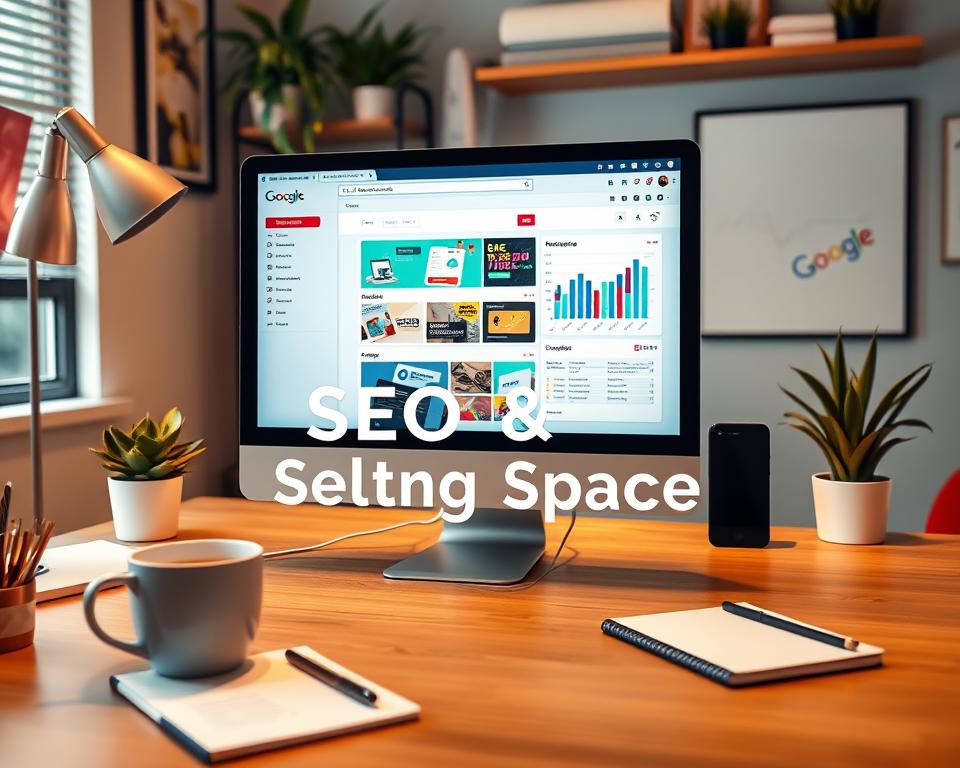If you’re a small business owner in Australia, you know how tough it is to stand out online. Your ecommerce site is crucial for your digital presence. Learning about search engine optimisation (SEO) is key to getting more visitors and sales1. Remember, 93% of all online searches start with a search engine1, and the top spots get most of the clicks1.
We’re going to share important tips and tricks to make your ecommerce site search-friendly. You’ll learn how to write great product descriptions, use schema markup, and build a strong backlink profile. These steps will help you get more people to see your online store.
Key Takeaways
- Optimising your ecommerce website for search engines can significantly boost your online visibility and sales.
- Effective keyword research and implementation can help you target the right customers and improve search rankings.
- Technical SEO elements, such as fast loading times and mobile responsiveness, are crucial for providing a seamless user experience.
- Building a strong backlink profile and leveraging user-generated content can enhance your site’s authority and credibility.
- Continuous monitoring and optimisation of your ecommerce SEO strategy is essential for staying ahead of the competition.
Understanding Ecommerce SEO
Ecommerce SEO makes your online store more visible on search engines. It’s key for getting more visitors without just using ads2.
What is Ecommerce SEO?
Ecommerce SEO uses tactics like keyword research and content creation to make your site better for search engines. The aim is to rank higher in search results, helping more people find your products2.
Why is SEO Important for Ecommerce?
An ecommerce site must draw in visitors and turn them into buyers. Being easy to find in search results is vital2. SEO is a top investment for ecommerce, bringing in more traffic and sales2.
SEO is also a budget-friendly way to reach customers without ads. It helps build trust for brands2. Unlike ad spending, which is huge, SEO is a cost-effective choice3. Most marketing pros find content marketing very effective for their brands3.
Over half of marketers use organic traffic to check content success. And 70% are putting more into content marketing3.
Optimising your site for search engines boosts your store’s visibility. It draws in more leads and increases sales. So, ecommerce SEO is key for a successful online business324.
Ecommerce SEO
Getting your ecommerce site ready for search engines is key to getting more visitors and selling more. Know your audience and set clear SEO goals. This helps you make a strong ecommerce SEO plan that includes site structure, URL setup, and linking within your site5.
First, do some research on your audience to find out who they are and what they search for. Knowing the keywords they use is vital for making your content better and showing up in search results6.
- Make your URL structure SEO-friendly so search engines can easily find and list your product and category pages5.
- Have a clear site map and link strategy to help Google see how your web pages are connected and their importance5.
- Make your product descriptions better by using the right keywords, but also make sure they help potential customers6.
- Use schema markup to give more info about your products, which can make them stand out in search results5.
- Work on getting high-quality backlinks from important websites and sources in your industry6.
By following these ecommerce SEO tips, you can make your site more visible, get more relevant traffic, and boost sales56.
“Ecommerce SEO is not just about ranking high in search results – it’s about creating an exceptional user experience that leads to conversions.” – SEO Expert, Jane Doe
Keyword Research for Ecommerce
Effective keyword research is key to successful ecommerce SEO. It helps you find the right keywords to draw in relevant traffic and boost sales. Start by looking into keywords your potential customers might use, including both info and shopping keywords7.
Identifying Target Keywords
Use tools like Google Keyword Planner, Ahrefs, or Semrush to find relevant keywords. Check their search volume and competition, and get more ideas7. It’s important to understand how users search to make your content better match their needs7.
Tools and Techniques for Effective Keyword Research
Make a keyword strategy that includes long-tail keywords for less competitive searches8. Look at the Keyword Difficulty (KD) to pick keywords that fit your site’s level8. Also, use free tools like Google Autosuggest and Google Related Searches to grow your keyword list7.
Quality content is more important than just having lots of keywords. Aim to create content that’s informative and engaging, matching your target keywords and helping your customers9. By focusing on the right keywords, you can improve your site’s visibility and get more conversions9.
Source Links
- Mastering E-commerce SEO for Small Businesses: Proven Strategies and Tips – On-Page – https://blog.on-page.ai/e-commerce-seo-for-small-business/
- Ecommerce SEO: A Simple Guide for Beginners – https://www.semrush.com/blog/ecommerce-seo/
- Ecommerce SEO: How Online Stores Can Drive Organic Traffic – https://www.bigcommerce.com.au/articles/ecommerce/ecommerce-seo/
- The Industry Leading Ecommerce SEO Guide (2024) – Shopify Australia – https://www.shopify.com/au/blog/ecommerce-seo-beginners-guide
- SEO Best Practices for Ecommerce Sites | Google Search Central | Documentation | Google for Developers – https://developers.google.com/search/docs/specialty/ecommerce
- 2024 eCommerce SEO Checklist to Boost Your Online Sales – https://nitropack.io/blog/post/ecommerce-seo-checklist
- How to Keyword Research for Ecommerce Websites (For Free!) – https://www.ecommerce-gold.com/ecommerce-keyword-research/
- Ecommerce Keyword Research: A Practical Guide – https://www.semrush.com/blog/ecommerce-keyword-research/
- Ecommerce Keyword Research: Proven Strategies + Tools – https://www.bigcommerce.com/articles/ecommerce/keyword-research/











